Spotlight Conversation: OG badass feminist activist Virg Parks (Part 2 of 2)
As Texas goes deeper red, and abortion remains the hot-button issue of American electoral politics, Parks is rediscovering the activist fire that sparked in ACT UP and keeps her going. (Part Two)
Virg Parks, lifelong Dem, and keeper of the freedom flame, volunteering at the November 2022 election polls in Houston. Photo: Virg Parks personal archive.
PART 2 (For Part 1, see the main page of the ‘Tell Me Everything’ Substack.)
Virg moved into AIDS activism when she and her girlfriend were still together in Austin. She started volunteering at an AIDS service organization there, then working on an AIDS information hotline and doing some public speaking. That’s when I got interested in the relationship to health, she explains. If you can talk about vaginal secretions and penises, you can talk about anything. She found she was good at it; her childhood debate skills quickly surfaced. She also began volunteering to offer care to those in late-stage AIDS.
Her gay best friend JP – John Pullen – had moved to New York City and was sick with AIDS; he eventually died in 1986. I couldn’t do anything to help him, she recalls, still sad at the memory. He was so beautiful in every way…tall, blonde, and from Georgia…he had that lovely accent, she tells me. He was at St. Vincent’s (hospital) in New York and by the time I went to see him, he was already in a coma. So, AIDS became my passion. That was part of the breakup, too, she adds, because her girlfriend wasn’t as engaged. One time she asked me, ‘why do you have to do so much?’ Virg says. ‘Because people like you aren’t doing anything,’ she replied. She was furious, and grieving.
She was among the early members of ACT UP Austin when a representative of the New York chapter visited the group to share information about what other chapters were up to. A woman Virg cared for gave her a flyer about a new group that was forming. She says, ‘you’re the only person I know who is angrier about this fucking disease than I am…it sounds like something you need to be part of….’
Good trouble: Virg with ACT UP mentor and pal Brenda Lein with a symbolic big bomb at a time when HIV activists were pushing for a Manhattan Project on AIDS. Photo: Virg Parks personal archive.
In the summer of 1991, another friend was driving to California on vacation, so they drove out together. Virg reconnected with her lesbian ex, who’d moved to San Francisco and had a motorcycle. She met me at the front door with a leather jacket and a helmet and said, ‘I think this might fit you. Come on, we’re late.’ They headed straight for an ACT UP– Golden Gate (GG) meeting, where Virg promptly fell in love – this time with a group. ACT UP GG, she tells me, felt like a new home.
The room was full of heady talk about meetings with pharma reps and actions. I was already excited, Virg tells me, reliving the moment, thinking, ‘these people are awesome!’ Someone was reporting back about the International AIDS Conference. ‘Oh my God!’ she thought, thrilled by the intelligence and scientific information being shared. By the time she returned to Texas, she’d made the decision to move. She packed up all her worldly belongings in a van and headed back to San Francisco.
I found this really nurturing group of other nerds. They said, ‘we can teach you the science.’ She quickly stepped into treatment activism, and by summer 1993, she was headed to Berlin for the Ninth International Conference on AIDS. She’d plunged fully into direct action organizing, risking arrest in civil disobedience actions. There were still no good drugs to treat HIV and so many friends were dying, but she also felt more alive than ever, clear about the importance of her actions.
Virg began working with WORLD – Women Organized to Respond to Life Threatening Diseases -- founded by Rebecca Denison, a dynamic HIV-positive activist and mother. WORLD was in its infancy, an idea and a vision Rebecca had scratched out in her living room and shared with other positive women in Oakland. Virg helped the group get its 501C3 tax-exempt status and she says, that’s where her real HIV education deepened. Every month, she’d volunteer to help get WORLD’s newsletter out to a growing mailing list. I learned about women’s issues, and HIV- positive women’s issues, sitting in those mailings and just listening to them, she says about the first wave of WORLD leaders. Some were Black women who’d overcome homelessness and addiction. They opened her eyes to how the epidemic was affecting them and their families.
In the mid-90s, Oakland led the nation as an epicenter of gang and gun violence. AIDS was ravaging the Black community and spreading to immigrant communities including the Laotian, Vietnamese and Burmese. The women in WORLD were going to multiple funerals every week. Out of every three, two were from guns, one from AIDS, she recalls. What Virg learned from positive women was that “AIDS is just one more thing trying to kill us.” Almost everything that I know in my gut about how to be a decent ally and speaking for people who society doesn’t’ let them speak…and using my white privilege…all of it came from the women in West Oakland—every bit of it.
ACT UP - Golden Gate, Virg’s adopted home in the 90s. Photo: Virg Parks personal archive.
One critical thing she learned from these women was the importance of having children and keeping the ones they already had alive. An ACT UP colleague told her that UCSF was forming a pediatric advisory board for its HIV clinical trials; she jumped on board. Peds treatment activism became her jam, and the Pediatric AIDS Clinical Trial Group (PACTG), a new battleground. Within ACT UP, the historic low enrollment of women and children in HIV clinical trials, especially those living in poverty, remained an urgent feminist health battle; pregnancy is often cited as a de facto exclusion criterion in clinical research. One of ACT UP’s biggest victories is around ACTG 076, a seminal clinical trial that showed AZT could largely prevent mother-to-child transmission of HIV. (AZT reduced HIV transmission by two-thirds in pregnant women with no prior antiretroviral treatment in the 076 study.)
But the fight didn’t end there. Long-term AZT safety data was still needed in both women and children. It was 1996, the breakthrough year when protease drugs changed the course of the epidemic overnight, while 076 secured the future for generations of children. Within the PACTG, the Executive Committee planned to stop researching HIV treatments in children and focus all their funding on preventing prenatal transmission, citing the canard of low enrollment by women. Economic and social factors were limiting women’s entry into HIV trials and that was hardly news.
La nueva familia: ACT UP Golden Gate in the early 90s. (Virg, smiling, in plaid). Photo: Virg Parks personal archive.
Virg knew the only way to convince researchers and pharma execs about what positive women needed to participate in trials was to put it in the language they understood: data. In 1996, she presented the results of a survey she developed in positive women, Regarding Research, that shed light on the challenges of recruiting women into clinical trials. This was at the same historic Vancouver AIDS conference where protease drugs captured global headlines.
By then, Virg was also feeling some early activist burnout. In fighting for others, she’d overlooked the critical component of self-care. That included her education. I guess it was about ’97, ‘98 when I started saying that I was totally burnt out. I was doing pediatric ACTG; I still had not finished my undergrad…if I was going to survive the AIDS epidemic, I had to finish my degree at least. She enrolled at New College and earned college credits by writing essays about her activism. Then 9-11 happened, and one of her roommates went a little bonkers. To Virg, it was a sign that something needed to change. She got out of the city and spent her last six months in California on twenty beautiful acres that a friend owned, resting and healing.
Artist Unknown, from an ACT UP Womens’ Caucus flyer, c.1990. Source: Judy Sisneros ACT UP/Los Angeles Records, ONE Archives at the USC Libraries.
Back in Texas, Virg’s mother had developed Alzheimer’s. She decided to return home to Houston to care for her. She began working with chronically unhoused folks via an AmeriCorps internship at the VA homeless program. Colleagues pushed her to consider social work, but she wasn’t sure. Then the University of Houston opened up a Leadership and Advocacy track in their social work program. After earning her graduate degree, she unexpectedly hit a fallow period, getting and then leaving jobs that proved too low-paying or ended. I never imagined I would have two degrees and be unemployed, she tells me of that difficult period. I was looking for work every day. I was terribly depressed.
That’s when a good friend stepped in with a lead on a volunteer opportunity, doing abortion clinic defense. Virg wasn’t working yet and had extra time. A big 2014 omnibus bill had essentially shut down 30 of 42 clinics offering abortion services in Texas, and the operating clinics were in emergency mode. One weekend they were short-staffed, Virg tells me. Every patient was saying, ‘you’re so nice…everyone here is so nice….’ She inquired about a social work hire and got the job. I was there for seven years until the Supreme Court and the state of Texas started making it a crime.
The moment everything changed, Virg had the day off work. The clinic was crazy busy, as always, and with the ruling, there were lot of patients crying, and we were crying. I went to work to be with my friends and coworkers. I had to grieve. While the SCOTUS decision put an immediate end to the clinic’s abortion services, there was still work to be done, breaking down patient charts and packing up. Virg stayed on as part of a skeleton crew while everyone scrambled to meet the moment. The clinic’s owner, a physician, had stopped paying himself back in 2021, when the first serious rumblings of a policy shift occurred in Texas. He wanted to make sure the staff was paid, Virg explains. Some of the clinic nurses found jobs elsewhere, but much of the staff, like her, searched for ways to respond -- as activists.
That was the job I thought I was gonna retire from, she says, still a bit shocked at the turn of events. Her physician-director had told her he wouldn’t retire until she did. We joked that we were all gonna retire at the same time. So that of course didn’t’ happen. And I was kind of freaked out. I was 64; who the fuck is going to hire me?
The answer, of course, is other reproductive health activists who were closely following the fallout in Texas and Louisiana and elsewhere abortion is now illegal. They quickly set up a special jobs bulletin board for those who’d lost their jobs in abortion clinics. Virg’s boss sent her referrals to organizations. One day, she spotted the job she now has, in the state and city she won’t name, because that would be risky. Anti-choice forces, emboldened by the SCOTUS ruling, have lost no time escalating their attacks.
Virg can’t share too many details about the organization she’s joined, which was formed in 2017 and initially focused on sending abortion pills by mail order. As it stands now, only a few clinics in Texas remain open, offering ultrasound and some reproductive health services to women. One way to help them secure safe abortions is outside Texas, in a state where abortion is legal. In the wake of the SCOTUS ruling, a wave of women and girls from Texas crossed state lines to secure legal abortions elsewhere. That’s ongoing.
Virg regards the team that she’s joined, including some repro health veterans like her, a new activist family, because that’s how it feels to her. She’s found a new political home, and the cause couldn’t be more urgent, the way AIDS was in the 90s. She works at a pop-up mobile clinic where most of the early patients have been from Texas and Louisiana, which also outlawed abortion. As in ACT UP, her organization is learning as it rolls out the program.
Given the risks, the outreach work to identify clients in Texas is done carefully, via movement networks of providers and activists. There’s a shit ton of prep to do for every case, she says, including mundane but critical issues like lunch. (Remember snacks in ACT UP? Whoever brought snacks to actions was the day’s hero). The mobile clinic launched soon after Roe’s fall. Not surprisingly, demand for services has outpaced supply – for now.
At the same time, Virg is happy to report that, this time ‘round, someone got the early memo about the need for self-care and pacing to support long-term advocacy work. She’s a hired social worker but, for now, does a bit of everything to help get the wheels rolling on the bus, as it were. She feels supported, paid well enough, and is better equipped to ward off any future burnout that may come from keeping one’s feet close to the virtual fire.
Jane Does, demanding access to abortion and other reproductive services as a matter of justice, with a spotlight on immigrant women’s health needs. Source: Jane’s Due Process.
So, here she is again, away from home in a brand-new place, meeting a new crisis moment. Her parents died several years ago; she left her brother to tend to the family home, an older sister and extended family. She misses her friends and worries about the community in Houston. Abbott’s re-election has only emboldened anti-choice MAGA voices there. It’s only month three and the jump onto the fast-moving job train remains demanding and exhausting. For two months, she worked a mostly remote hybrid schedule, flying in biweekly to do the new clinic. Now, she’s unpacked and settling into her new home, but just barely.
Yet what she’s given up pales in comparison to the excitement she feels about what her organization is doing, and what’s in the cards. She’s newly in love, this time with her Travel Team, a group of feisty caring folks who’ve quickly bonded. Shades of the WORLD women, I think.
They are just amazing, Virg says. I feel so proud. Even in the clinic in Houston, I didn’t always feel like I was always part of a team. Here, we are a fucking team!
There’s also her role on that team, which is fast growing. The mobile clinic has gone from every two weeks, to weekly, and will become a twice-weekly program after January. They told me, ‘When we expand this to other states, you are going to be the person going there, showing them how it’s done,’ Virg says. The word is spreading about their program.
Does that feel exciting? I ask, thinking to myself, it could be overwhelming.
It really does, she replies, clearly thrilled, repeating it again. It really does.
It’s also bringing back a familiar feeling. It’s like ACT UP, she adds, describing a sense of urgency and take-it-to-the-streets action and mission. I haven’t felt that kind of feeling since ACT UP. This is groundshaking; it’s a precedent that needs to be set.
Somebody has to challenge these stupid-ass laws, she adds a second later. It might be scary, but somebody needs to challenge them.
Go Virg, I’m thinking after we hang up. Her group is small, scrappy and brave. She’s not doing civil disobedience this time, and the mobile abortion work is legal, but it’s still fraught. The rightwing attacks on abortion clinics and activists can be violent and scary. They have to be very careful, do everything right, protect the safety and confidentiality of their clients and sources. They aren’t alone; other pro-abortion rights groups are mobilizing, too, just as ACT UP chapters mushroomed to fight government AIDS inaction and homophobia. As a fellow activist and feminist, I feel so proud of Virg, and very grateful to Team Travel and the networks undertaking this critical work. They’re saving people’s lives -- again.
Act Up for Abortion Rights!
— END of PART TWO.
A Texas activist on the job: Virg as legal observer, 2018. Photo: Virg Parks archive.
Links to learn more:
The aftermath of the Roe V. Wade rollback decision for Texas: Texas abortion law: Here’s how the repeal of Roe v. Wade would affect it | The Texas Tribune
The Lynching Project of Sam Houston State University: Lynching In Texas
ACT UP – Golden Gate: ACT-UP Golden Gate Records, 1988-1993 — Calisphere
Abortion Rights groups working on reproductive justice in and outside Texas:
Janes Due Process: https://janesdueprocess.org/ (Note: while this Texas organization has suspected abortions in Texas, its hotline is still operating.
National Abortion Federation: https://prochoice.org/
The Lilith Fund for Reproductive Equality: https://www.lilithfund.org/ This project, based in Austin, offers support to Texas women who cannot afford abortions, and is working within the legal limits of Texas law to comply with existing regulations.
I need an abortion. This website provides accurate information for anyone seeking an abortion, and does so legally, while respecting confidentiality.

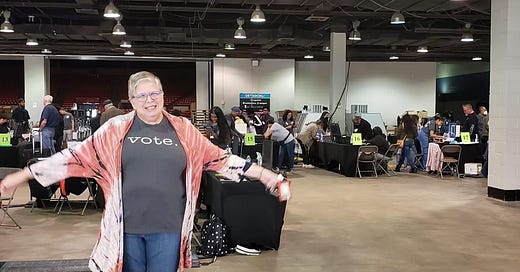



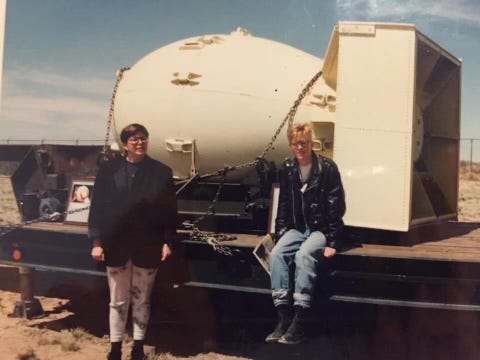
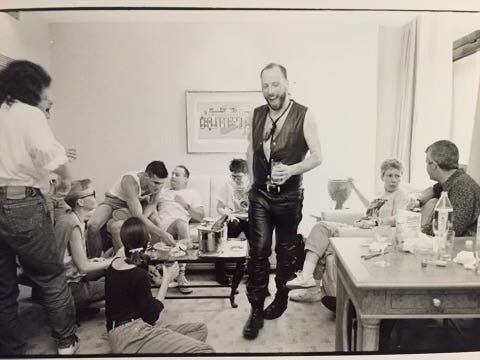
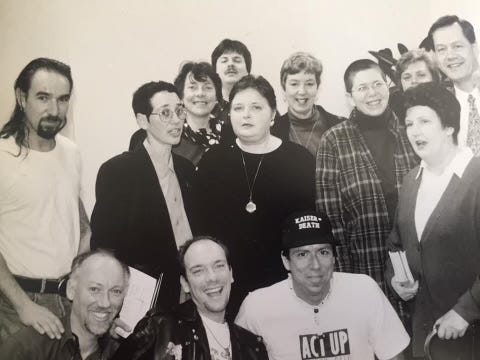
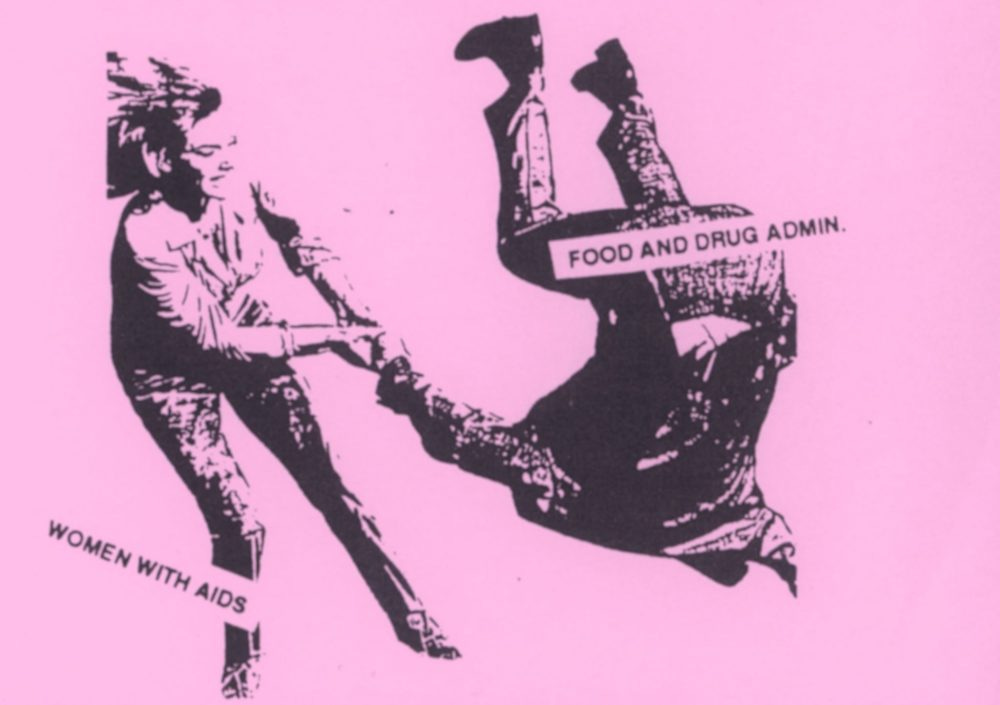

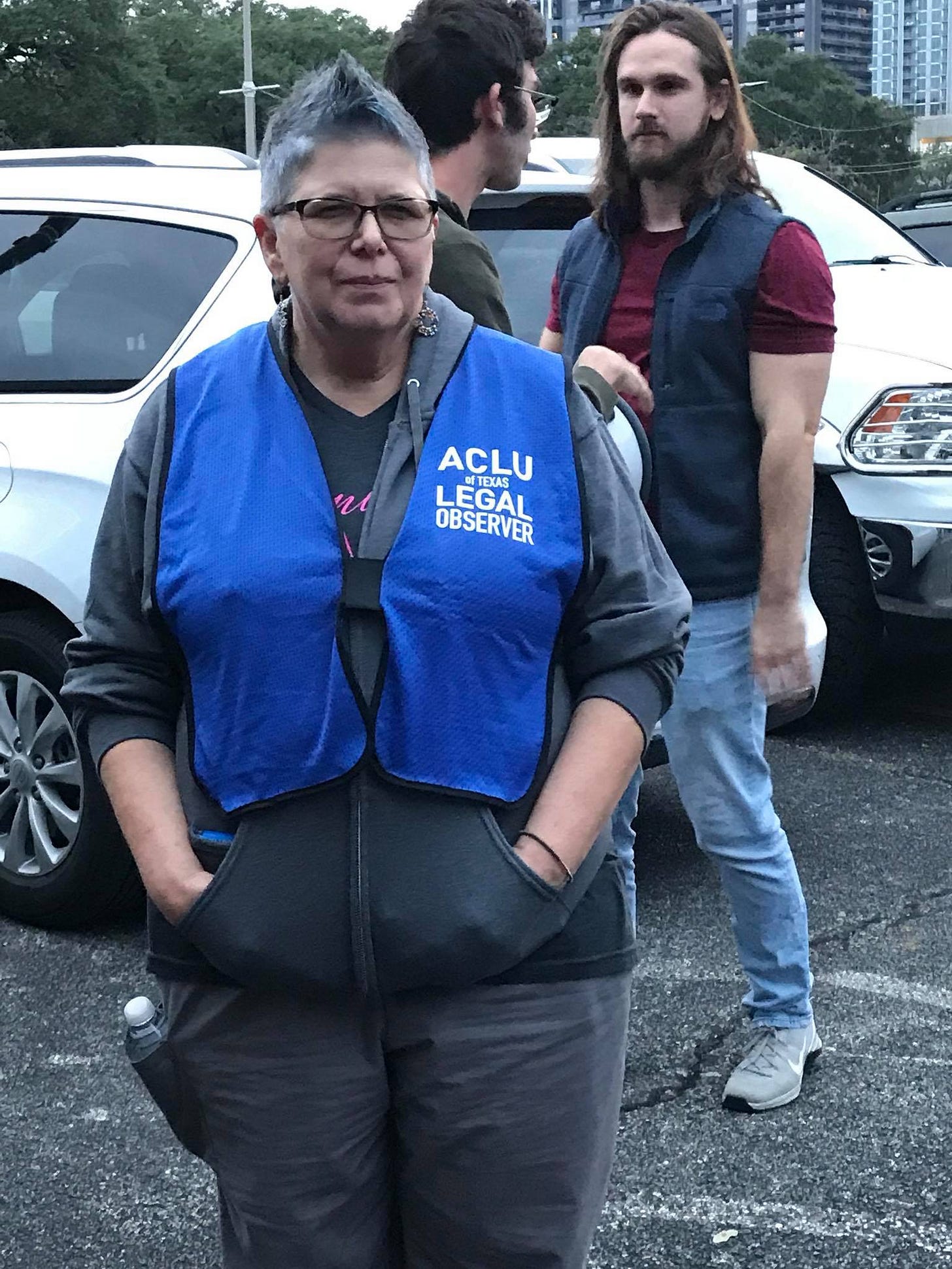
Anne-christine this is such a wonderful piece about the one-and-only Virg. She was one of the first people I met in SF when I moved there in 1992. She was welcoming and warm and an incredible role model and activist guide. I am so glad you are bringing her incredible passion, dedication, fierceness, and impact into the light.
I absolutely love that you are doing these profiles. Thank you!